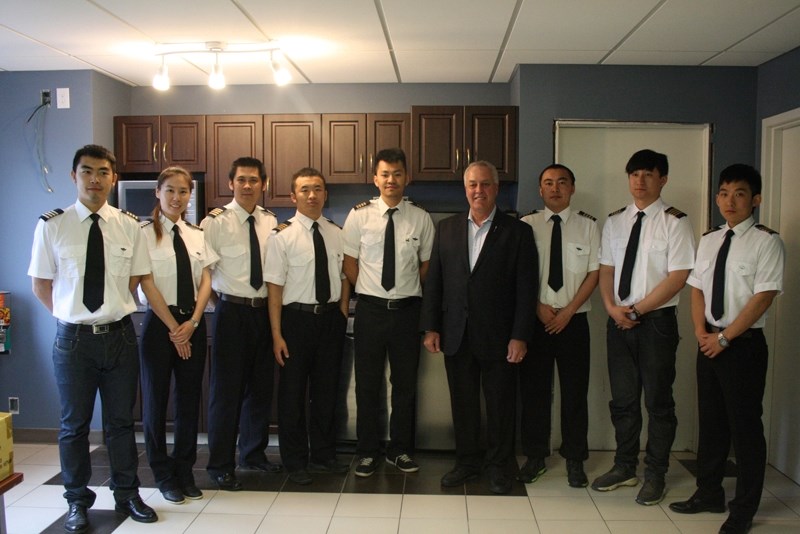Bai Bingchen touched down in Canada in March 2012 to begin his odyssey in the air, along with a small contingent of students sent over by the China Flying Dragon Aviation airline.
The 26-year-old adopted the English name Angus after coming across it on the Internet, without realizing how appropriate his new moniker would be to his year of life in Central Alberta.
More than anything he was looking forward to soaring.
“The most fun thing is when I fly solo,” Bai said at his graduation at a hangar at the Red Deer Regional Airport May 24. “You can fly anywhere you want.”
A partnership between the multifaceted airline based in Harbin, in China's northeastern province of Heilongjin, and Springbrook's Sky Wings Aviation Academy Ltd. facilitated in part by Alberta's foreign affairs ministry, allowed nine students to get their commercial pilot's licence and multi-engine instrument ratings in just a year.
This training would normally take four years in China.
“In the air it's different totally,” he said. “I like landing also. When you have a good landing you feel very happy.”
The graduation was the culmination of a long journey for the students of not only soaking up aviation know-how, but also writing English-language essays and experiencing the Canadian culture through floor hockey games and Albertan cuisine.
Behind the scenes the program represented a meeting of needs between two global economic players. Alberta is seeking to forge new international relationships in the wake of the Western financial crisis after years of cozying up to the United States.
As China grows it will not only require access to a stable supply of natural resources, but also a fresh workforce of skilled labourers to keep things moving and its people safe.
“Since the 1940s we've relied on foreign investment to develop our economy,” said MLA Cal Dallas, minister of international and intergovernmental relations with the Alberta government. “There's a change in where that investment is coming from.”
Alberta plans to double resources in its Bejing office which has functioned as a component of the New West Partnership, an effort launched by then-Alberta Premier Ed Stelmach in 2010 alongside B.C. and Saskatchewan, in a bid to tap into new international markets and workforces.
“We've really expanded our presence in China,” Dallas said. “The world is looking at Alberta as a place to invest.”
In addition, Alberta will open a new office in Shanghai, and another at an undetermined location in southern China, complementing the staff members working out of the Hong Kong bureau.
Dallas contends these Chinese strategic positions will help Alberta make an even bigger splash within the continent, and soon the province will have a diplomatic presence in Singapore and New Delhi on top of current locations in Tokyo, Seoul and Taipei.
There may be 43 airlines in China, but there are only 24,000 pilots, compared with 46,000 pilots in Canada for just 28 airlines – meaning China desperately needs about 40,000 more, according to Sky Wings CEO Dennis Cooper.
Flying Dragon runs short-haul passenger and cargo flights, performs search and rescue missions, conducts aerial photography and operates forestry protection services. Bai says as a graduate of the Sky Wings program he is automatically signed on for a 15-year contract.
Wen Shan, vice-president of training for the Chinese airline, said Alberta's Bejing office made the visa acquisition process seamless, easing the students' transition into Canadian education.
“Their staff was very helpful,” Wen said. “Based on what we achieved, we'd like to send more students over.”
Chu Yu, 23, from Shenyang in Liaoning province in the northeast of the country, took the name Candice for life in Canada.
As diplomas were handed out and a commemorative video played to a soundtrack of R. Kelly's I Believe I Can Fly, she teared up.
“One year we lived together,” Chu said. “We're just like family. I'm going to miss them.”
She is also glad to be a role model for women in China. Chu's heard there are just 1,000 female aviators in the entire country of 1.3 billion.
“Very few girls learn flying in China,” she said, pointing out she was the only one in this crop of graduates. “I'm proud of this. There's only one girl here.”
Guo Haorui, 26, a.k.a. Tony, said the Canadian flight education came with fewer restrictions than a similar scenario in China.
“We have lots of limitations if you want to fly in China,” Guo said, adding being up above everything is an extraordinary experience he can't get enough of. “You just feel freedom.”




